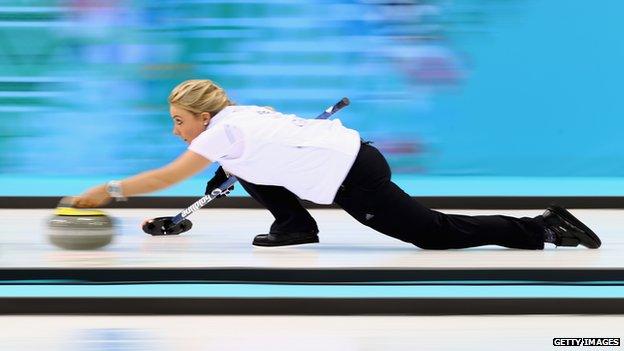Winter Olympics: What is curling?
- Published
- comments

Curling has got to be one of the more unique sports on offer at the Winter Olympic Games.
It may not be one you know all that much about, but Great Britain's curling teams have an impressive track record in recent Games.
At the Salt Lake City games in 2002, the British female team won a brilliant gold medal, whilst in Sochi in 2014, the men's team took home silver while the women earned a bronze.
But what on earth is curling? How do you play? How do you win? And how can we watch along and enjoy it during the upcoming Winter Olympics in Beijing?
Follow this guide to find out all this and more.
How is curling played?
An early version of curling was said to be invented in 16th century Scotland, when very brave people took to frozen ponds and lochs and "threw" stones along the ice.
But the sport we know today was born in 1838 when the first official rules of the game were written at the Royal Caledonian Curling Club.
The game is played on a long ice sheet (called a rink), around 45 metres long, with a target at the end called the 'house'.
Two teams, (usually of four players, but there is also a mixed doubles tournament), take turns in sliding 18 kilogram granite stones down the ice towards the house aiming to get as close to the centre as possible.
Each team slides eight stones in a round, which is called an end. There are ten ends in a game.
How do you score points?
The team with stones closest to the button at the completion of an end scores points
Points are scored by leaving stones closest to the white centre circle, or 'button', after the eight stones have been pushed.
The team with the closest stone to the button scores a point. If they have more than one stone closer to the button than the other team they will score more points.
Great Britain once set a record for most points scored in an end after they finished with seven stones in the house without a single opposition stone nearby.
Why all the sweeping?
As the stone is pushed along the ice, it is slowed down by friction and tiny ice pebbles on the playing surface.
Sweeping and brushing the ice, melts these pebbles so the stone will travel further.
Sweeping will also cause the stone to stay to a straighter line.
Sometimes, after knocking an opponent's stone out of the way, sweeping in front of it can make the stone travel further from the house.
How do you win?
A curling match lasts for ten ends, and the team with the most points at the end of these ten rounds is declared the winner.
Usually only one or two points are scored per end so matches tend to be quite close.
Other terms you may hear:
Hogline: The player throwing the stone, called the shooter, must release the stone before they cross the red line on the ice, known as the hogline.
Round-robin: The Olympic curling competition begins with a round robin format. This is a type of tournament in which each team meets all other countries in turn. This means that you can lose the odd match but still advance to the knock-out stages if you produce a good performances in your other games.
Guard: A stone that stops in front of the house and protects the others. For example, you may see a player aim to land a stone in front of the house in order to keep the closer stones safe from being knocked out of the house by the opposing team.
Skip: This is the captain of the team. They are in charge of tactics, strategy and they throw the last two stones of an end so must have a good aim.
What are Team GB's chances this year?
Jen Dodd and Bruce Mouat could be medal contenders for Team GB
Bruce Mouat and Jen Dodd could be ones to watch in the mixed doubles tournament.
They are heading into the Games ranked first in the world!
Bruce is also the men's team skip, and won world silver with Grant Hardie, Bobby Lammie and Hammy McMillan in 2021.
Women's skip Eve Muirhead is attending her third Olympics and will want to add to her bronze medal from 2014 after finishing an agonising fourth in 2018.
She has an entirely new team alongside her, made up of Hailey Duff, Vicky Wright, Jen Dodds and Mili Smith.
- Published3 February 2022
- Published4 February 2022
- Published22 January 2020
